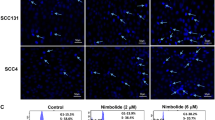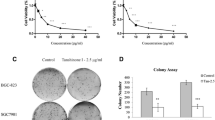Abstract
The study aimed to explore tumor suppressor mechanism of ARNTL from the perspective of autophagy in oral cancer. Human oral squamous carcinoma HN6 cells stably overexpressing ARNTL were established, cell viability and apoptosis were detected by CCK-8 and TUNEL assays, and intracellular autophagosomes were observed under electron microscopy. Western Blot detected expressions of Beclin1, LC3 II/I, ATG-12, P62, BAX and BCL-2. Bafilomycin A1 was used to detect autophagic flux, and Western Blot was used to detect changes of LC3II and P62 proteins. Autophinib was added to cells with ARNTL overexpression for recovery experiments, and cell proliferation and apoptosis were detected by flow cytometry. In vivo tumorigenesis experiment was used to evaluate the in vivo anti-tumor efficacy of ARNTL, and Western blot simultaneously detected ARNTL, LC3 II/I, Beclin1, P62 and ATG-12 expressions. ARNTL overexpression promoted apoptosis and autophagy and inhibited cell viability. In ARNTL-overexpressing cells, expressions of Beclin1, LC3 II/I, and BAX were significantly up-regulated, while P62 and BCL-2 expressions were decreased, and ATG-12 expression wasn't significantly changed. When the autophagy inhibitor Autophinib was used, expressions of elevated BAX and decreased BCL-2 were reversed effectively, as were decreased cell proliferation index and increased apoptosis index. An in vivo tumorigenesis assay also showed ARNTL overexpression inhibited tumor growth, and autophagy-related protein expressions were consistent with the in vitro data. The research demonstrated for the first time that ARNTL induced apoptosis and inhibited cell proliferation dependent on autophagy in oral cancer, which provides theoretical basis for potential therapeutic targets.





Similar content being viewed by others
References
Johnson DE, Burtness B, Leemans CR, et al. Head and neck squamous cell carcinoma. Nat Rev Dis Primers. 2020;6(1):92.
Bray F, Ferlay J, Soerjomataram I, et al. Global cancer statistics 2018: GLOBOCAN estimates of incidence and mortality worldwide for 36 cancers in 185 countries. CA Cancer. 2018;68(6):394–424.
Gibson C, Oconnor M, White R, et al. I didn’t even recognise myself’: survivors experiences of altered appearance and body image distress during and after treatment for head and neck cancer. Cancers. 2021;13(15):3893.
Hardeland R. Melatonin and the pathologies of weakened or dysregulated circadian oscillators. J Pineal Res. 2017. https://doi.org/10.1111/jpi.12377.
Bunger MK, Wilsbacher LD, Moran SM, et al. Mop3 is an essential component of the master circadian pacemaker in mammals. Cell. 2000;103(7):1009–17.
Rijo-Ferreira F, Takahashi JS. Genomics of circadian rhythms in health and disease. Genome Med. 2019;11(1):82.
Wu R, Dang F, Li P, et al. The circadian protein Period2 suppresses mTORC1 activity via recruiting Tsc1 to mTORC1 complex. Cell Metab. 2019;29(3):653-667.e6.
Huang G, Zhang F, Ye Q, et al. The circadian clock regulates autophagy directly through the nuclear hormone receptor Nr1d1/Rev-erbα and indirectly via Cebpb/(C/ebpβ) in zebrafish. Autophagy. 2016;12(8):1292–309.
Liu L, Cao Q, Gao W, et al. Melatonin ameliorates cerebral ischemia-reperfusion injury in diabetic mice by enhancing autophagy via the SIRT1-BMAL1 pathway. FASEB J. 2021;35(12): e22040.
Jeong K, He B, Nohara K, et al. Dual attenuation of proteasomal and autophagic BMAL1 degradation in ClockΔ19/+ mice contributes to improved glucose homeostasis. Sci Rep. 2015;5:12801.
He QY, Jin F, Li YY, et al. Prognostic significance of downregulated BMAL1 and upregulated Ki-67 proteins in nasopharyngeal carcinoma. Chronobiol Int. 2018;35(3):348–57.
Tang Q, Cheng B, Xie M, et al. Circadian clock gene bmal1 inhibits tumorigenesis and increases paclitaxel sensitivity in tongue squamous cell carcinoma. Cancer Res. 2017;77(2):532–44.
Jiang W, Zhao S, Jiang X, et al. The circadian clock gene Bmal1 acts as a potential anti-oncogene in pancreatic cancer by activating the p53 tumor suppressor pathway. Cancer Lett. 2016;371(2):314–25.
Huang T, Song X, Yang Y, et al. Autophagy and Hallmarks of Cancer. Crit Rev Oncog. 2018;23(5–6):247–67.
Bhutia SK, Praharaj PP, Bhol CS, et al. Monitoring and measuring mammalian autophagy. Methods Mol Biol. 2019;1854:209–22.
Jia R, Bonifacino JS. The ubiquitin isopeptidase USP10 deubiquitinates LC3B to increase LC3B levels and autophagic activity. J Biol Chem. 2021;296: 100405.
Booth LA, Roberts JL, Dent P. The role of cell signaling in the crosstalk between autophagy and apoptosis in the regulation of tumor cell survival in response to sorafenib and neratinib. Semin Cancer Biol. 2020;66:129–39.
Wan B, Zang Y, Wang L. Overexpression of Beclin1 inhibits proliferation and promotes apoptosis of human laryngeal squamous carcinoma cell Hep-2. Onco Targets Ther. 2018;11:3827–33.
Gammoh N, Fraser J, Puente C, et al. Suppression of autophagy impedes glioblastoma development and induces senescence. Autophagy. 2016;12(9):1431–9.
Santanam U, Banach-Petrosky W, Abate-Shen C, et al. Atg7 cooperates with Pten loss to drive prostate cancer tumor growth. Genes Dev. 2016;30(4):399–407.
Ariosa AR, Lahiri V, Lei Y, et al. A perspective on the role of autophagy in cancer. Biochim Biophys Acta Mol Basis Dis. 2021;1867(12): 166262.
Funding
This study was supported by the Natural Science Foundation Project of Chongqing (CSTC2019jcyj-msxmX0191), and Science Project of the Chongqing Municipal Health Commission (Grant No. 2021MSXM31).
Author information
Authors and Affiliations
Corresponding authors
Ethics declarations
Conflict of interest
No potential conflicts of interest were disclosed.
Additional information
Publisher's Note
Springer Nature remains neutral with regard to jurisdictional claims in published maps and institutional affiliations.
Supplementary Information
Below is the link to the electronic supplementary material.
Rights and permissions
Springer Nature or its licensor holds exclusive rights to this article under a publishing agreement with the author(s) or other rightsholder(s); author self-archiving of the accepted manuscript version of this article is solely governed by the terms of such publishing agreement and applicable law.
About this article
Cite this article
Li, H., Li, M., Chen, K. et al. The circadian clock gene ARNTL overexpression suppresses oral cancer progression by inducing apoptosis via activating autophagy. Med Oncol 39, 244 (2022). https://doi.org/10.1007/s12032-022-01832-7
Received:
Accepted:
Published:
DOI: https://doi.org/10.1007/s12032-022-01832-7




